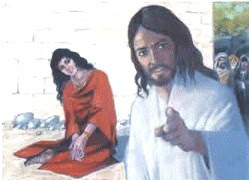 Most people are taught to live out their vocation in their lives by the influence of others. If they are taught about God and his teachings, they will have a better understanding of how exactly to live out their vocations to the fullest. Some of those who teach us about vocations and give us the knowledge to know, love, and serve God are priests, deacons, and religious brothers and sisters. These individuals not only help us to understand what a vocation is, but also how to live it out in everything that we could possibly do. But how do these people influence us to follow our own vocations? It’s really quite simple.
Most people are taught to live out their vocation in their lives by the influence of others. If they are taught about God and his teachings, they will have a better understanding of how exactly to live out their vocations to the fullest. Some of those who teach us about vocations and give us the knowledge to know, love, and serve God are priests, deacons, and religious brothers and sisters. These individuals not only help us to understand what a vocation is, but also how to live it out in everything that we could possibly do. But how do these people influence us to follow our own vocations? It’s really quite simple.Priests are one group of people that help us to follow our own vocations. While in church, the priests teach us the Word of God. When they teach us the Word, they are essentially giving us the information to know how to live our own vocations. Using the priest’s teachings about God as guidelines to live out His calling in everything that we do, we can know, love, and serve God more easily.
Another group of people that help us in vocations are religious brothers and sisters. These people give complete devotion to the Lord. They have to take three vows: chastity, poverty, and obedience. Taking these vows means that they have to give up freedoms that others have, such as getting married. However, they don’t care about not having those freedoms. They are so dedicated to God that they don’t need to worry about having petty freedoms like those, especially while they’re in God’s hands. People who need help with their own vocations could be inspired by the religious brothers and sisters and their great devotion to God so much that they may consider becoming one themselves. And if they don’t want to go that far, at least they would be inspired to live out their vocations to their fullest.
The last group of people is the deacons. The deacons assist the priest in various church tasks, such as Communion. Communion is an incredibly important part of Mass, because it allows for those who are in the church and taking Communion to become closer to God. Deacons also have to go through a lot of training to get in their position, and that takes true dedication on their part. Much like the way that religious brothers and sisters influence the people, deacons could inspire people because of their dedication to their position. In addition, receiving the Eucharist can cause people to become closer to Christ, causing them to be encouraged to live their vocations to their fullest.




 Priests, deacons, and religious brothers and sisters, using what they have learned by their life and ministry, invite others to share in the teachings of Christ using the examples they set. When good examples are set they are showing us what they have learned and telling us of what we will learn.
Priests, deacons, and religious brothers and sisters, using what they have learned by their life and ministry, invite others to share in the teachings of Christ using the examples they set. When good examples are set they are showing us what they have learned and telling us of what we will learn.





